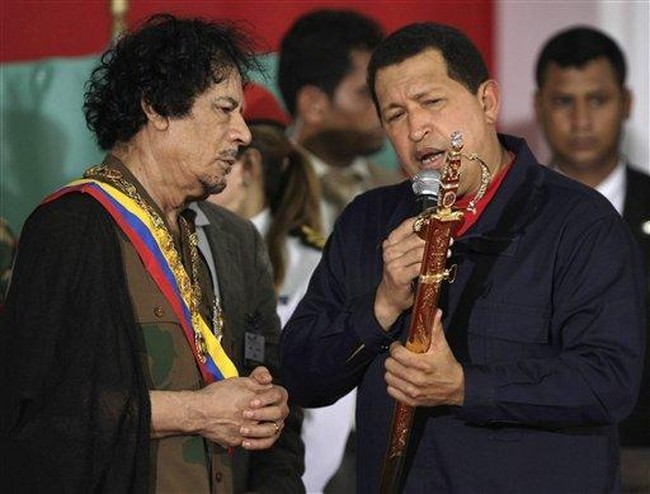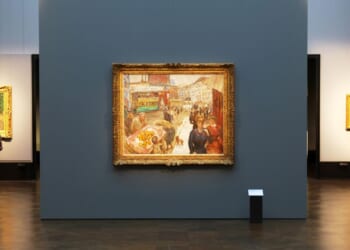
How Gaddafi Rose, Ruled, and Turned
In 1969, Muammar Gaddafi siezed power using a succesful coup against King Idris, while promising to modernize Libya.
He styled himself as a revolutionary savior with a manic desire to shape global politics by blending Arab nationalismand Islamic socialism.
Black gold made it possible. Using oil wealth to build free education, housing programs, and public works, Gaddafi also built one of the most repressive security states in the Arab world.
Gaddafi’s Libya was one of the sources of funds for terror groups from the IRA to the Abu Nidal Organization for decades. After Libya’s involvement in the Berlin disco bombing in 1986, the U.S. bombed Tripoli and Benghazi, killing one of his daughters and deepening his hatred toward Washington.
Suddenly, in 2003, the man who once mocked America as THE “imperialist enemy” wanted to talk. The answer to the question “why?” is two parts: crippling sanctions and his fear of suffering the same fate as Saddam Hussein. Gaddafi dropped any ambitions of nuclear weapons, invited inspectors, and paid reparations for past attacks.
Cautiously, Washington reopened ties; Tony Blair’s “deal in the desert” in 2004 was the reason why Libya returned to polite company:
Even Condoleeza Rice paid a vist in 2008.
Once caricatured as a madman, Gaddafi found himself as someone people wanted to talk to.
The Mirage of Stability
Libya stayed a one-man show behind the photo ops, loyalty was paid for with oil money, rivalries between tribes simmered, and his revolutionary rhetoric lost its bite over time.
Gaddafi’s makeover looked like redemption to Western capitals that wanted the world to settle down.
Along the way, Gaddafi became a case study in how pressure reforms a tyrant.
Until 2011 proved otherwise.
The Uprising and the Air War
That February, the Arab Spring reached Libya; demonstrators erupted in Benghazi, where Gaddafi’s troops opened fire.
NATO’s goal was “protecting citizens” after rebels armed themselves; on paper it was a humanitarian goal. In practice, however, the name of the game was regime change.
Leading the charge was France and Britain, followed by a weak Obama Adminstration leading from behind, and backed by Secretary of State Hillary Clinton. UN Resolution 1973 opened up the playing field, giving license for “all necessary measures,” and within weeks, NATO warplanes cleared the path for rebels.
It was October 20, 2011, that Gaddafi’s convoy fled Sirte when French jets hit it. Bloodied but alive, rebel fighters pulled him from a drainage pipe, but died minutes later.
What came next was detailed by the Human Rights Watch report “Death of a Dictator;” mass prisoner executions, 66 corpses found at the site, and the mutilation of Gaddafi’s body.
The new government promised justice.
None came.
“We Came, We Saw, He Died”
After hearing the news, Clinton laughed and uttered the infamous quote, “We came, we saw, he died.” Meant as gallows humor, it came across as, if you can believe it from Clinton, hubris.
That phrase became shorthand for the West’s moral self-absolution, while displaying the tirumphal sneer of a world power congratulating itself.
It didn’t take long; within a year, Libya was rapidly collapsing into rival fiefdoms. Militias looted arsenals, while Islamic State dug roots in Sirte, the city where Gaddafi was killed.
Later, U.S. drones would strike that city again; this time hunting jihadists born from the ashes of “victory.”
The Split Screen of Media Reaction
The 2011 Arab Spring was paised by left-leaning outlets as history’s march towards democracy. The New York Times called it a model intervention; MSNBC hosts talked about moral necessity.
In contrast, conservative media celebrated the demise of Gaddafi, but warned anybody listening of déjà vu: Commentors on Fox News and National Review likened the void left by Gaddafi’s killing to Iraq’s post-Saddam chaos.
Warnings from the conservative media proved prophetic: Libya dissolved into regions ruled by warlords, while left-leaning publications very quietly repurposed their coverage around humanitarian regret and policy lesssons.
Later, the Lightbringer himself called the aftermath his worst mistake, while Felonias vonPansuit called it unfinished business.
The right called it like it saw things: an avoidable collapse of a once-functioning state into chaos.
All engineered by moral vanity disguised as diplomacy.
The Aftermath That Never Ended
The Libya left behind still compromised of rival governments located in Tripoli and Benghazi. Three main groups worked to carve a piece out of a broken country: Russia’s Wagner mercenaries, Turkish troops, and tribal militias.
Shattered governments aren’t able to govern, and this situation proved it.
The 2023 Derna flood killed thousands, but rain alone wasn’t the cause of death; that fell to neglected infrastructure and nonexistance governance.
In a cruel irony the learned on the Left will never admit, Gaddafi’s death was, and symbolized, the end of a dictatorship. It instead marked the death of Libya as a nation, standing today as a marketplace of militias and foreign flags. Not a state.
The Lesson the West Keeps Ignoring
People like Gaddafi are, to the best of their ability, survivors. The change of heart he showed wasn’t because of any love of liberty; it was his survival instinct. What happened to Gaddafi shows what happens with pragmatism is mistaken for progress, and when intervention is mistaken for policy.
The West needed a neat ending, a movie drama that doesn’t need a part two, which was called rebuilding.
Libya became the sequel nobody wanted to film.
Final Thoughts
A camera captured Hillary’s grin, history caught the cost. The fall of Libya wasn’t inevitable, simply hurried along.
The world stopped asking what came after the dictator and started a parade of self-congratulations. When Obama called it his greatest mistake, he wasn’t talking anything about moral failure, he admitted there was no idea, much less a plan, for peace.
Stalking the Mediterranean, Gaddafi’s ghost whispers that when a nation dies without direction, it doesn’t vanish: It metastasizes.
Libya created instability that seeped across all borders, breeding terror cells in Mali and Niger, pushing waves of migrants north, and drawing in foreign powers like Russia and Turkey so they could wage proxy wars.
Libya is the perfect parable for modern leadership, where those who fancy themselves visionaries mistake intervention for mastery.
And the laws of unintended consequences stands by, reminding them who’s really in charge.
The Cost of Easy Wars
Libya was supposed to be the clean war. No boots, no quagmire, no mess. Instead, it became the blueprint for modern chaos. The press celebrated the fall of a tyrant while ignoring the rise of terror. PJ Media is one of the few places still tracing the long tail of those decisions, and the smirk that symbolized them.
If you value truth told without filters or applause lines, join us. Support fearless reporting that connects the dots between what leaders say and what nations suffer.
Join PJ Media VIP and use promo code POTUS47 to get 74% off your membership.











